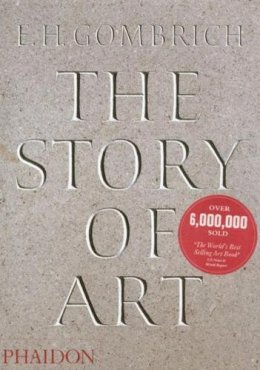Ernst Gombrich was one of the greatest and least conventional art historians of his age, achieving fame and distinction in three separate spheres: as a scholar, as a popularizer of art, and as a pioneer of the application of the psychology of perception to the study of art. His best-known book, The Story of Art - first published 50 years ago and now in its sixteenth edition - is one of the most influential books ever written about art. His books further include The Sense of Order (1979) and The Preference for the Primitive (2002), as well as a total of 11 volumes of collected essays and reviews. Gombrich was born in Vienna in 1909 and died in London in November 2001. He came to London in 1936 to work at the Warburg Institute, where he eventually became Director from 1959 until his retirement in 1976. He won numerous international honours, including a knighthood, the Order of Merit and the Goethe, Hegel and Erasmus prizes. Gifted with a powerful mind and prodigious memory, he was also an outstanding communicator, with a clear and forceful prose style. His works are models of good art-historical writing, and reflect his humanism and his deep and abiding concern with the standards and values of our cultural heritage.
"Like every art historian of my generation, my way of thinking about pictures has been in large measure shaped by Ernst Gombrich. I was 15 when I read The Story of Art and like millions since, I felt I had been given a map of a great country, and with it the confidence to explore further without fear of being overwhelmed."—Neil MacGregor, former Director of the National Gallery, London, 1995 "Almost as well known as the Mona Lisa, Sir Ernst Gombrich's The Story of Art unites learning and pleasure."—Pierre Rosenberg, Président-Directeur, Musée du Louvre, Paris "More people... have been introduced to the world of fine art, in the last 45 years, though Ernst Gombrich's The Story of Art than through any other single book."—Christopher Frayling, Professor of Cultural History, Royal College of Art, London "The country's bestselling book on art, never out of print, still in demand (and not just by students) and one of the few 'gift books' that actually gets read. The work is not so simplistic as the title implies, but it is this very title that rendered the book enormously attractive in 1950 to a new sort of book buyer: the self-educator. This field was set to grow, publishers eagerly wooing punters into buying the one big book on every impossibly massive but key subject. But with Gombrich, art was all sewn up."—The Times "The Story of Art has just about everything you need to follow the course of art from cave painting to David Hockney - I am surprised it’s not yet been placed in hotels on the bedside table along with Gideon’s Bible since Gombrich is as authoritative as the voice of God - the book has always been a pleasure to read and handle, the colour plates, now with many new additions, are excellent and the text is clear and straightforward, devoid of both pedantry and academic tedium."—The Birmingham Post "As a humane, uncomplicated but unpatronising account of art from prehistoric cave daubs to twentieth-century splurges, Gombrich’s Story of Art is just what its title promises: more of a story than a work of reference, yet that as well."—Business Weekly "A wise and wide-ranging introduction to art history that will last and last."—The List "At 90-odd, the prolific art historian is still going strong. His populist approach comes from his childhood in Vienna, where art was for everyone, not just for stuffed shirts."—The Mail on Sunday "Gombrich has done more than any other human being to draw people towards an enlightened understanding of art. Wearing his immense learning lightly, tackling abstract ideas without losing his readers in jargon, he has attracted a devoted following."—The Sunday Times "The gift he gave us was to make the living process of art understandable to us all. Rather than a dry cultural history, he made looking at art - that perceptual experience - an adventure."—Antony Gormley, artist "Did more tham any other writer in the last 100 years to introduce a wider public to a love of art. Successive generations of students have been drawn to The Story of Art, his erudite survey of Western art, and his big idea: "There is no such thing as art - there are only artists." An academic who stayed firmly outside his profession's charmed circle, his book was intended as a rallying cry against snobbery and elitism, and has remained a classic."—Antique Dealer and Collector's Guide "Ernst Gombrich was the most famous art historian in the world. His reputation was based on a particular approach to the subject, or the mastery of a single period, than on the breadth of his interests and his skill at making the history of art interesting to a non-specialist public."—Independent "...Lucid and endlessly informative..."—The Good Book Guide "Gombrich's voice is lively, opinionated, and almost conversational, yet his erudition shines through to make a book that is both accessible and informative."—Library Journal "This comprehensive look at Western art from prehistoric times on up to the present has been completely redesigned and extensively revised and updated."—Booklist "Enjoy the most famous book on art ever published... This has been revamped for the first time since 1972, offering larger illustrations, more color, and improved text and coverage. Highly recommended."—Midwest Book Review

